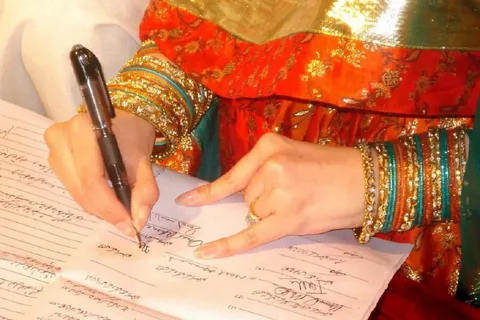So, you’re thinking about court marriage in Pakistan? Whether you’re in love, facing family pressure, or just prefer a private and legal way to marry, court marriage could be your ideal path. This guide explains everything from the court marriage in Pakistan to its legal rules, fees, and online possibilities.
Let’s clear up the confusion and walk you through the process—step by step.
What is Court Marriage in Pakistan?
Court marriage is a legal union between two consenting adults, solemnized in the presence of a marriage registrar, witnesses, and sometimes a legal professional. It’s a private alternative to traditional weddings and is recognized under Pakistani law.
It’s especially common among couples who face opposition or prefer not to have a large ceremony.
Court Marriage Law in Pakistan
Court marriages in Pakistan are governed by the Muslim Family Laws Ordinance 1961 and the Marriage Act 1872 (for non-Muslims).
According to the law:
- Both parties must consent freely.
- Both must be mentally sound and of legal age.
- A Nikah registrar or marriage officer must solemnize the marriage.
The court marriage procedure in Pakistan is completely legal and constitutionally protected.
Procedure of Court Marriage in Pakistan
Step-by-Step Court Marriage Process in Pakistan
Here’s how it typically works:
- Free will affidavit: Both parties sign a document declaring they are marrying of their own free will.
- Verification of age: CNIC or B-form confirms the legal age.
- Nikah ceremony: Conducted by a licensed Nikah Khawan or Registrar.
- Witnesses: Two adult witnesses must be present.
- Nikahnama Registration: The marriage is registered in official records.
- Court affidavit filing (optional): A legal affirmation of the marriage for added protection.
Some couples also file an affidavit of protection to avoid harassment from family members.
Age Limit for Court Marriage in Pakistan
According to Pakistani marriage law:
- For Muslims:
- Male: Minimum 18 years
- Female: Minimum 16 years
- For non-Muslims: Both must be 18 or older (under the Christian Marriage Act)
Note: Underage marriages can be challenged and legally invalidated.
Court Marriage in Pakistan Rules You Should Know
- Consent is everything—forced marriages are illegal.
- No one can stop a court marriage if both parties are adults and willing.
- It’s legal to marry without family consent.
- Protection petitions can be filed for couples fearing backlash.
- Court marriage is recognized nationwide, whether done in Lahore, Karachi, or anywhere else.
Documents Required for Court Marriage
You’ll typically need:
- CNIC or B-form (or passport for foreigners)
- 2 recent passport-sized photos
- Free will affidavit (drafted by a lawyer)
- Copies of CNICs of two witnesses
- Affidavit of marital status (unmarried/divorced/widowed)
- For non-Muslims: Certificate of religion
All documents should be original with copies for submission.
Court Marriage Certificate in Pakistan
Once the marriage is completed:
- You receive a Nikahnama (official marriage document).
- It’s registered with the Union Council.
- You can apply for an English-translated and computerized marriage certificate later.
This court marriage certificate Pakistan is valid for visa, immigration, inheritance, and all legal matters.
Court Marriage Fees in Pakistan
What does it cost?
- Lawyer’s service charges: PKR 15,000–50,000 (depending on city and urgency)
- Government fees: Usually around PKR 500–1000
- Nikah Registrar fee: Varies from PKR 1000–5000
Total court marriage fees in Pakistan usually range between PKR 20,000 to 60,000.
Court Marriage Fees in Lahore
In Lahore, typical costs include:
- Nikah registration: PKR 1000–3000
- Legal services: PKR 20,000–40,000
- Urgent cases or weekends may cost extra.
Tip: Always deal with licensed Nikah registrars and reputable lawyers.
Court Marriage in Lahore: How It Works Locally
Lahore, being a major city, has dedicated court marriage lawyers and Nikah Khawans. Most couples in Lahore prefer to marry in law offices or marriage registrar offices instead of courtrooms.
Advantages of Lahore court marriages:
- Quicker processing
- Availability of English/Urdu marriage certificates
- Convenient access to attestation services
Online Court Marriage in Pakistan: Is It Possible?
Technically, court marriage online in Pakistan is not fully online, but much of it can be digitally facilitated.
What you can do online:
- Consult a lawyer via WhatsApp/Zoom
- Submit documents via email
- Book appointments with marriage officers
- Get your documents prepared and couriered
However, physical presence is still required for signing and the actual Nikah ceremony.
Myths and Facts About Court Marriage in Pakistan
| Myth | Truth |
| Court marriage is illegal | It’s 100% legal under Pakistani law |
| You need parents’ permission | Not if you’re of legal age |
| Court marriage happens in a courtroom | It usually happens in law chambers or registrar offices |
| Only Muslims can do court marriage | Available for all religions under relevant laws |
Final Thought
Court marriage in Pakistan is a straightforward, legal way to get married—especially for couples who want privacy, independence, or are facing family opposition. Whether you’re in Lahore or abroad, this method ensures your union is recognized, protected, and documented.
From the procedure and documents, to fees and rules, now you have everything you need to make an informed decision. Want to avoid drama and keep it simple? Court marriage might just be your answer.
FAQs
- Is court marriage legal in Pakistan without parental consent?
Yes, if both individuals are adults, consent of parents is not legally required. - Can we do a court marriage online in Pakistan?
Some steps can be managed online (consultation and document prep), but the actual Nikah requires physical presence. - What is the age limit for court marriage in Pakistan?
Males must be 18+, females 16+ (for Muslims). For non-Muslims, both must be 18+. - How much does court marriage cost in Pakistan?
Total cost ranges from PKR 20,000 to 60,000 depending on services and city. - Is the court marriage certificate valid internationally?
Yes, it’s valid globally once translated and, if needed, attested by MOFA or the relevant embassy.



